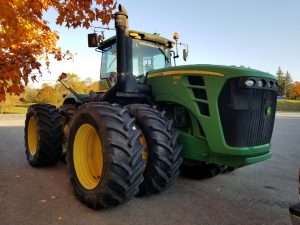ceat-speciality:blogs-tags/all,ceat-speciality:blogs-tags/tire-advice
Why Radial Tires are Better for Your Tractor
Sun, 19 Feb 2023 | PRODUCTS
Both bias-ply and radial tires have their place on the farm and ranch. Radial tires provide many important benefits, such as less soil compaction and more traction, but bias tires have a role in the right applications.
We will explain why radial tires are better for your tractor in most cases, but first definitions:
Bias tires — Tractors have been riding on bias tires ever since farmers left metal wheels for pneumatic tires in the 1930s. Bias tires feature multiple plies of rubber in a diagonal pattern from bead to bead, enabling the tread and sidewall to function as one unit. This results in a stiff and strong sidewall that can fend off damage from stumps and rocks. This stiffness provides excellent stability on hills.
On the downside, the bias tire’s stiff construction can deliver a punishing ride for the operator. When the sidewall of the bias tire flexes, so does the tread, which can lead to a smaller or distorted footprint; this can increase wheel slip, reduce traction, and result in additional compaction in the field.
Radial tires — In the radial-play design, the cord plies are arranged at 90 degrees to the direction of travel, or radially (from the center of the tire). This avoids having the plies rub against each other as the tire flexes, reducing the tire’s rolling friction.
Radial tires are the preferred option for most farm uses today. However, that’s not to say that old-fashioned bias-ply farm tires are obsolete. Because they cost less, bias tires are a great purchase for your secondary or utility tractors. This could be the tractor you use for mowing ditches, cutting and raking hay, and performing chores around cattle lots and other livestock sites.
So which is best for your farm equipment? It begins with answering these questions:
- What is your application?
- What is your needed load carrying capacity?
- Is compaction a concern?
- What is your timeline?
More Traction, Less Compaction
If the application requires high traction, you should target radials like the CEAT FARMAX R70 – same for reducing compaction.
What type of radial depends on the application, load carrying capacity needed and speed required. If high speed (above 25 mph) is required, you need a “D” rated or 40 mph rated tire. If the standard radial does not have an adequate load carrying capacity required for the most demanding application, which is quite often when you are roading equipment at the highest speeds, you should look to the “IF” and “VF” options, such as the CEAT Torquemax.
The “IF,” or increased flexion radials, carry about 20% more load than standard radials at the same inflation pressures. The “VF,” or very high flexion radials, carry about 40% more load than standard radials at the same inflation pressures.
Conversely, these high-tech tires can carry the same loads as standard radials with reduced inflation pressures. If you want to run the lowest inflation pressures you can to help minimize compaction, the “IF” and “VF” options will provide the best opportunities to achieve your objective.
The Bias Option
Bias do not provide the benefits of radial technology. If you want the best traction possible, improved efficiency, larger footprints, reduced compaction, a better ride, or any of the above, you need to go with radials.
In most cases, the bias tire will be less expensive than the radial but not always. Pricing differentials have narrowed in the last few years. It is always good to check both if you are considering bias tires. Another very important factor is the service life of a comparable radial . . . about 30% longer than the bias. Keep in mind that the pricing of the bias tires should be around 30% less than the radials to provide a comparable value or cost per hour of service regardless of additional benefits.
Above all, ask your tire dealer the right questions and request options along with the costs involved as well as the advantages and disadvantages of each option.











































